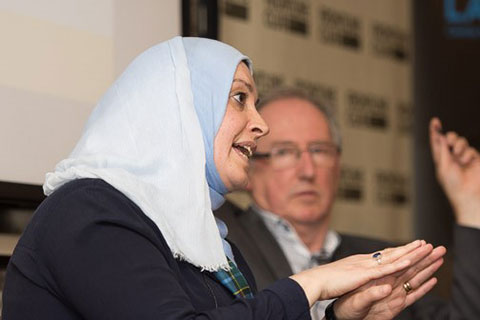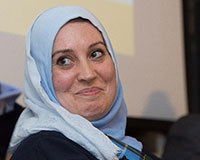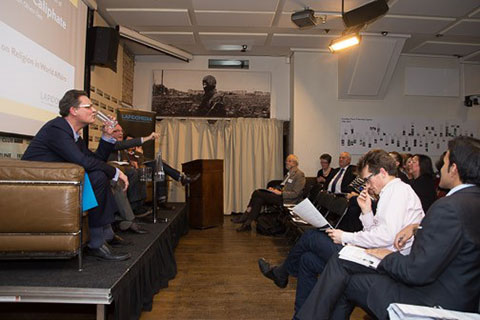‘Troubling distance between Muslims and the British media’ says broadcaster at our book launch
by - 3rd December 2015
 A BBC broadcaster who presented the Sunday programme on Radio 4 has described a troubling distance between British Muslims and the media.
A BBC broadcaster who presented the Sunday programme on Radio 4 has described a troubling distance between British Muslims and the media.
The few journalists who did want to understand Islam were often met with ‘resentment’ and a refusal to engage, Roger Bolton told an audience in London last night (Wednesday).
At a reception to launch Lapido’s media guide to the caliphate, on the night the Commons voted to bomb ISIS, Roger Bolton described his frustration presenting the BBC’s flagship religious current affairs programme for twelve years.
‘On the one hand journalists are often ignorant of their faith, but on the other, some Muslims resent the media’s interest,’ he insisted
‘Our knowledge of Islam, or knowledge of Muslims is pretty limited but Muslim ghettoes don’t help.’
He added that journalists were often guilty of ‘not really understanding properly the central role of faith in almost every aspect of life’.
Dr Shuruq Naguib, a lecturer in Islamic Studies at Lancaster University and co-chair of the British Association of Islamic Studies also accused sections of the media of ‘mischievous’ misrepresentations of Muslims.
At the event attended by journalists, academics and interfaith activists at London’s Frontline Club, it was education that came in for most criticism, implying that professionals with a responsibility to handle people’s faith had no background for doing so.
Bolton added: ‘Religious education is a farce at school.’
Liberal
As the nation voted to go to war against the latest manifestation of the caliphate – Islamic State or Daesh (in Arabic which means the same) - Lapido Media director Dr Jenny Taylor said that religious literacy was now urgent.
‘The tectonic plates of our whole civilisation are shifting,’ she said.
Without understanding the religious background to many of the stories dominating the news, journalists were simply ‘the blind leading the blind.’
‘What’s needed is a whole cultural change. Instead of ruling out religion from your stories as you are trained to do, you rule it back in.’

Dr Naguib addressed Muslim dissatisfaction over the structure of the modern liberal nation state, as playing a part in a desire for a Muslim world state. She said the West had no time for faith or religion.
‘The state relegates religious discourse to a narrow sphere. This is the heart of the crisis,’ she said.
Sharia was a crucial legal branch of Islam to many modern Muslims who resented the fact that the modern liberal state monopolised the creation of law.
The modern vision of a global caliphate was utopian, seeming to promise Muslim dreamers a space for religion to be exercised in both legal and personal terms.
Dr Carool Kersten who specialises in Islam and the Muslim world at King’s College, London cautioned against dwelling too much on the attraction of the caliphate and miss the most important thrust of the Islamic State.
‘What is much more central to IS is its millenarian agenda,’ he warned.
At the heart of the rise of IS was an all-encompassing Islamic political structure with a ‘caliph’ at its head. But this was a ‘fiction’ based on reading back from a utopian dream which resulted in ‘a skewed reading of their own past’, said the book’s author Dr Sean Oliver-Dee.

Oliver-Dee who is a Research Fellow at Oxford’s Centre for the Study of Religion in Public Life, and advises the Diocese of Peterborough, said that from the earliest Muslim dynasties to the secularising triumph of Ataturk in Turkey the idea of a caliphate was a fiction that had haunted the Islamic imagination.
It had been an important ‘unifying symbol’ for Muslims across continents.
But the modern manifestation in Syria and the Levant was a late twentieth-century idea coming on the back of the Islamic resurgence, Kersten said.
This was a time when many newly independent Muslim countries were experimenting with different governmental structures, and ‘nothing seemed to work’.
Some Sunni Muslims looked east and took inspiration from Shi’ite Iran, which combined elements of both democracy and theocracy.
For many Sunnis, the example of Iran proved that Islam was compatible with modern government and that a state which included religious aspects could survive.
Apocalypse
Oliver-Dee warned against judging the seriousness of caliphal aspirations in the Muslim world by the numbers responding to any poll about it. Although IS were relatively small in number, they were not to be underestimated.
‘History is littered with small groups of people who have changed society,’ he warned. ‘It involves commitment, energy and long term strategy.’
The Caliphate is a short illustrated guide with time-lines, quotes, sources, index and an accessible narrative suitable for any reader, particularly journalists needing facts covering the war against Islamic State. Available from Kindle price £6.50, or print-on-demand for £10 via Central Books 020 8525 8810, and shortly via Amazon.
